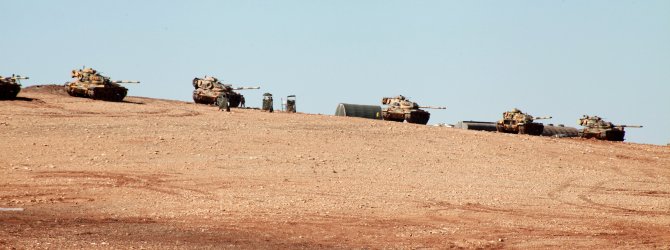-
The beginning of the end: why the diplomatic process ...
The beginning of the end: why the diplomatic process tells us that war in Syria is concluding

Syria. That’s really all you have to say. And if you wanted to elaborate, just go with what Staffan de Mistura said: The Syria crisis is the worst failure of the international community since the Second World War, and has the potential to extend beyond the region. All the challenges, the suffering, the power plays, the impossibilities, and whatever peace negotiations turned into nonversations.
Until now. Tomorrow has been set for Geneva III – all be it tentatively. Yet, for the first time since 2011, major international stakeholders recognise how their failures generated a situation that they essentially don’t want. This seems to have changed their predicated interest in the Syrian conflict, and the ensuing diplomatic process does call for hope.
Yes, I’m talking about the Vienna process. And yes, I know that it contains some unrealistic visions. Paragraph seven of the Vienna declaration calls for three things. First, credible and all-inclusive governance, which goes beyond the issue of government. So inclusion is definitely necessary, but including all 1200 armed opposition groups – some of whom are more extreme than Daesh – in a Syrian governance model is both impossible and undesirable. Perhaps we should start talking about inclusion of women, which automatically extends beyond which opposition groups to invite?
Second, drafting a constitution. Well, anyone who followed the Tunisian and Egyptian constitutional back and forth the past five years knows that this is a lengthy process – and these were two countries where 250 000 people had not been killed in armed conflict. Constitutions are important, but only if accompanied by constitutionalism. Transitional justice is more important in the interim period.
Third, it calls for elections – both parliamentary and presidential – to be held within 18 months, according to international standards, and under UN supervision. Overly optimistic and potentially dangerous; research shows that introducing democracy in a low-income post-conflict country increases the risk of reverting to violence by 70 percent. We expect elections to work miracles. News flash: they don’t.
But the point is that the content of the declaration is not what matters. The fact that Vienna I and II happened is what’s important here. And there are two things that tell me the tables have turned; that Geneva III won’t turn into another nonversation.
First, in the Vienna process, the US and Russia could at least agree to disagree about Assad. This may seem meaningless, but it was crucial for them to start agreeing on other points: the coherence of Syria, i.e. a plan to divide the country is out of question; the growth of violent extremism is a threat to all stakeholders; and that there is not going to be any victors. When you start charting common ground and interests, this is when actual tangible progress is made. Relations between the US and Russia have deteriorated over Ukraine. So finding them in the same room, on the same side of the tables, agreeing with each other… this is simply a big step forward. And in the very same room, there was Saudi Arabia, Iran, Jordan, the UK, Turkey and France, among others. This is progress.
Okay, I know what you’re thinking. The sectarian rift between Saudi and Iran. Turkey and the Kurds. Downing of that Russian jet. But this is my second point. To put it bluntly: this is good news. It sounds insensitive, but it indicates that stakeholders have started to sense that real negotiations are imminent; that a conflict resolution is on the horizon, even if still far ahead. This is negotiation tactics 101: it’s called pre-negotiation political positioning. Before any negotiation, parties will want to gain a stronger position to leverage against others and therefore it’s also when you see strong statements or increased military activity.
And by the way, the Vienna process also gave birth to the International Syria Support Group (ISSG), which according to rock-star Syria analyst Aron Lund was “certainly the most unambiguous positive piece of news of the year”.
All of this is far from a comprehensive solution, an exodus in the Syrian tragedy, and the realities on the ground remain. There is still a lot of human suffering ahead. Contention will not wane. The talks in Geneva might even be postponed last-minute. But the diplomatic progress in Vienna, the international roughing, and actors actually engaging in dialogue and debate calls for hope. It shows that the premise has changed, and this may eventually bring about that comprehensive political solution that Syria needs.

